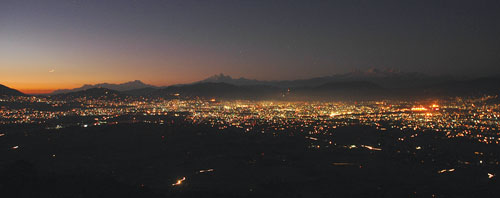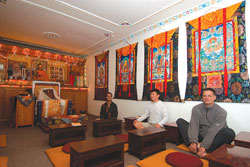
(RAJESH KC)
"Kathmandu, I'll soon be seeing you," sang Cat Stevens with his warm, persuasive voice back in 1970. The British songwriter's captivating tune led a whole generation to dream of this mystical city, a sacred place packed with temples and shrouded in a thick cloud of incense.
The myth has never been completely dispelled. Over 10,000 people a year, more than half foreigners, still flock to the many Buddhist meditation centres in the valley to satisfy their craving for a spiritual experience. During the war years, when tourism collapsed, it was in fact meditation tourism that kept the industry alive.
Marjolijne Blankevoort, a 25-year-old from Holland, attended a 12-day retreat at the Vipassana Meditation Centre in Budanilkantha last spring. Now, seven months on, she remains enthusiastic about the experience.
The rules at the centre are draconian: wake-up call at 4AM, 11 hours of meditation a day, no physical or eye contact, no sexual activity, no reading, writing or taking notes, no intoxicants, music, make-up, jewellery or charms. What's more, observing 'Noble Silence' means you are expected to remain totally silent for the duration of the retreat. Vipassana literally means 'to see'.
The regime is tough, but for Marjolijne the benefits made it worthwhile. "Even though I don't think Vipassana can rid you of suffering, it certainly gives you a way of dealing with it," she told Nepali Times. "You can do so by seeing the suffering, going through the suffering, accepting your own suffering and letting go of it."
She recalls a funny episode: during the course, she was plagued by head lice. Her teacher told her the cause of the itching could be sensations from her past-until one day she breached the number one rule, 'don't kill', to show him that the 'sensation' was pretty real.
"When I showed him the dead bug, we both started laughing," says Marjolijne, an airport security coordinator in Amsterdam. But the 'miraculous' thing, as she describes it, was that while meditating she sometimes stopped feeling the discomfort on her scalp.
"The same thing goes for suffering in general," she adds. "Through meditation you are able to rid yourself of the pain you feel. By noticing it and accepting it, it eventually disappears."
Another very popular option, though a rather more relaxed one, is provided by Kopan Monastery, an oasis of peace on a hill not far from Bodhnath, where the 10-day courses are attended mostly by westerners. Here you are allowed to talk in the afternoon. You can even chat with the monks at the sunny tables outside the cafeteria.
Louise Nielsen, a 29-year-old from Denmark, is very happy with her time at the monastery. "I made quite a lot of friends here," she told us just before leaving Kopan. "People are very nice and open to you, because this experience makes you all go through different moods-sadness, melancholy, happiness-and that makes you feel a lot closer. We will definitely keep in touch and support each other if we have questions about what we have learned here."
Ani Karin, a soft-spoken woman wearing the dark red robes of a Buddhist nun, explains the huge popularity of Buddhism in western countries.
"In Buddhism, it is through debating and questioning that one comes to wisdom," says the Swede, who has been teaching at Kopan for many years. "Most western people like this approach. They like to understand before they believe in something."
These retreats, although short, are sufficient to teach people compassion and make them aware of their responsibility for the happiness and well-being of others, she says.
"When I look at the faces of people who leave at the end of a course, they look very calm and peaceful, and there is a glimpse of real compassion in their eyes, which is wonderful, I think. It means they really take something personal from here, for their whole life."
Pilgrimage tourism
|
|
"We are currently holding meetings with the Nepal Tourism Board to find ways of collaborating," Antonio Pascual at the Thamel-based centre told Nepali Times.
"Developing this sector would benefit both the Nepali people and the government."
Pascual says that even at difficult times for Nepal, westerners never stopped coming to attend Buddhist retreats. He is currently working on some statistics, but says that the flow has been pretty much constant even through the years of political unrest.
The event is scheduled to take place at Hyatt Regency Hotel on 16 December from 4-6PM, and is expected to attract people from the tourism industry as well as expats, diplomats, NGOs and students of Lama Zopa Rinpoche, the co-founder of Kopan Monastery.
Presentations will be given by the Foundation for the Preservation of the Mahayana Tradition (FPMT), the HBMC and NTB. Kyabje Lama Zopa Rinpoche will hold a speach. Refreshments and a Tara dance performed by the nuns from the Khachoe Ghakyil nunnery will close the conference.
Irene Peroni
JOINING A MEDITATION COURSE
Kopan Monastery
Seven- or ten-day introductory retreats run once a month from March-October. Price is respectively $80/110, food and lodging included. A more advanced, one-month course runs in November each year. Most participants tend to have some previous experience in meditation. Other courses available.
www.kopan-monastery.com, 977-1-4821268, kopan@mail.com
Himalayan Buddhist Meditation Center
This is Kopan's drop-in centre in Thamel. They offer free yoga classes (7-7.45 AM, Mon, Wed, Fri), free daily meditation classes (8.30-9.30 AM and 5.30-6.30 PM Mon-Fri) and an introduction to Buddhism (10AM-12PM Sat, Rs 400, lunch included). Tailor-made meditation courses for small groups available upon request. http://fpmt-hbmc.org, 977-1-4700895, hbmc.programs@gmail.com
Nepal Vipassana Center - Dharmashringa
Two monthly ten-day retreats are held all year at the centre in Budanilkantha. Longer courses as well as short courses for former students are also available. A free donation is usually made at the end of the course. http://www.np.dhamma.org;
city office: Jyoti Bhawan Kantipath, 977-1-4250581, info@shringa.dhamma.org



